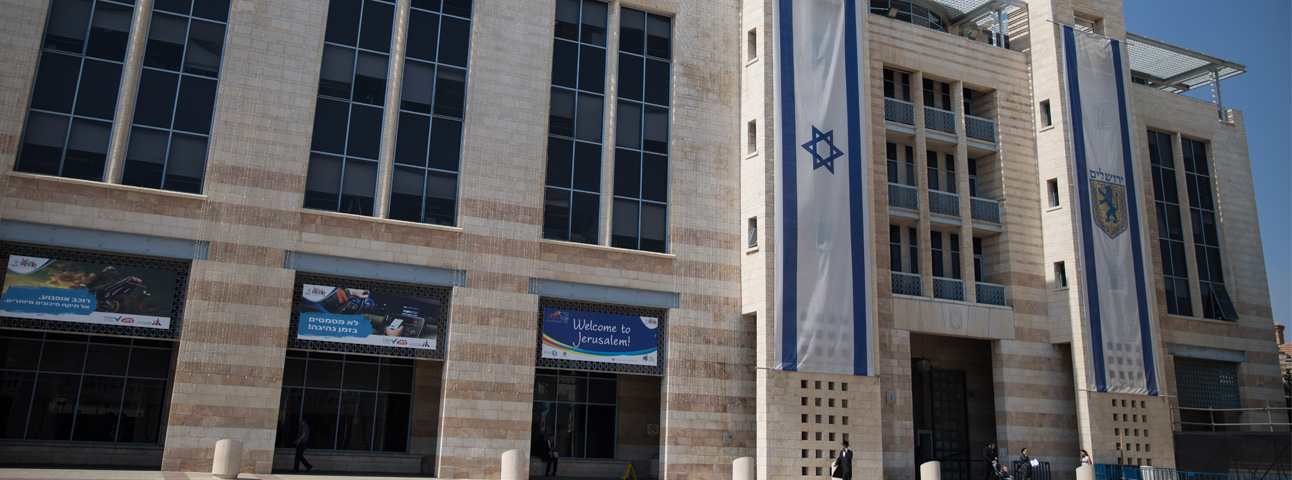67% of Israelis Want to Transfer More Power from Government to Local Authorities
Israelis express a high degree of trust in their municipalities and there is strong support for transferring more authority away from national government ministries to local authorities.

Jerusalem Municipal Building | Flash 90
(Jerusalem, January 6, 2022) Yohanan Plesner, President of the Israel Democracy Institute, and Prof. Tamar Hermann, Director of IDI's Viterbi Family Center for Public Opinion and Policy Research, presented President Isaac Herzog with the Israeli Democracy Index for 2021 today (Thursday). The Democracy Index, an annual publication for the past nineteen years, reveals a complex picture regarding the level of public trust in key institutions and officials, confidence in the country's civil service and the overall strength of Israeli democracy.
Six proposals for political reforms were surveyed, four of which relate to electoral reforms and two to governmental reforms. 67% of the public was in favor of transferring more powers from government ministries to local authorities. 56% were in favor of using an 'open' ballot were voters can rank the candidates on the party slates, and about half support proposals to amend the Basic Law by a majority of at least 80 MKs and to add regional representation to the Knesset elections (53% and 51%, respectively). The two proposals with the least support (about 40% each) relate to granting higher party funding to parties who present slates of candidates with at least one-third female representation and giving Israelis living abroad the opportunity to vote in Knesset elections.
Main Findings
Trust Local Authorities – 57% of Israelis trust their local authority – and this relatively high level of trust is stable over time. However, this year, the rate of trust in the sample of Jews was much higher than in the sample of Arabs (62%, respectively, compared with 32%).
Compared to last year, among Jews the situation remained the same (in 2020 63%) but among Arabs there was a significant decrease (in 2020 48%). This may be due to discontentment in how the Arab authorities functioned during the COVID pandemic and the severe violence in localities with a large Arab population.
Segmenting the sample of Jews according to their own position on the ultra-Orthodox-secular continuum shows that in all groups there is a majority who trust the local authority where they live, but in the religious group the rate of trust in the authority is highest (75%) and among non-religious traditional ones it is lowest (57%).
Transferring Power – 68% of Jews and 60% of Arabs think that more power should be transferred from government ministries to local authorities. This support can be explained by the high level of trust in local authorities.
The segmentation of answers indicates that the Jews' support for transferring more powers from government ministries to local authorities is greater than that of the Arabs, possibly due to higher levels of trust in the past year.
%, Jewish and Arab sample
| Support | Oppose | Don't know | Total | |
| Jews | 68 | 16.5 | 15.5 | 100 |
| Arabs | 60 | 31 | 9 | 100 |
80 MKs Needed to Amend Basic Laws – 55% of Jewish Israelis support a law that would mandate 80 MKs vote in favor in order to make changes to Basic Laws and 27% oppose it. Arab Israelis are more divided on this issue with 43% in support and 39% oppose it.
More Funding for Parties with Higher Female Representation – 42% of Israelis support and 43% oppose providing more funds to political parties that at least a third of their slate for the Knesset include women candidates.
A breakdown of the Jewish sample by self-identification on the ultra-Orthodox-secular continuum, by political camps and gender shows that while almost half of secular Jewish Israelis support higher party funding based on the composition of the candidate list, in the other groups only about a third (traditional religious) or less (traditional non-religious, religious, Haredim) support this.
%, Jewish sample
| Support | Oppose | Don't know | ||
| Self-identification on the Haredi-secular continuum | Haredim | 20 | 69 | 11 |
| National Religious | 20 | 65 | 15 | |
| Traditional Religious | 36 | 45 | 19 | |
| Traditional non-Religious | 28 | 51 | 21 | |
| Secular | 46.5 | 39 | 14.5 | |
| Political Camp | Left | 57 | 31 | 12 |
| Center | 42 | 42 | 16 | |
| Right | 27 | 56 | 17 | |
| Gender | Men | 29 | 55 | 16 |
| Women | 41 | 41 | 18 |
The 2021 Democracy Index was prepared by the Viterbi Family Center for Public Opinion and Policy Research of the Israel Democracy Institute. In the survey, which was conducted on the internet and by telephone (supplements of groups that are not sufficiently represented on the network) from June 15-24 2021 & October 24-27, 2021. In October1004 men and women were interviewed in Hebrew and 184 in Arabic, constituting a representative national sample of the entire adult population of Israel aged 18 and older. The maximum sampling error for the entire sample was 2.9%± at a confidence level of 95%. The fieldwork was done for the June survey by the Dialogue Institute (Jews) and the Afkar Institute (Arabs) and for the October survey by the Midgam Institute. For the full data file see: Data Israel
